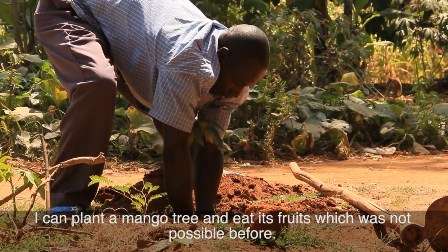Film shows that having HIV in Africa is no longer a death sentence

A new documentary produced by the University of East Anglia reveals how the lives of people with HIV in Africa have been transformed by antiretroviral therapy (ART) and highlights the crucial need for continued funding of the lifesaving treatment.
The 30-minute film, developed in partnership with the Medical Research Council/Uganda Virus Research Institute (MRC/UVRI), is about the changing face of HIV in Uganda, a country where 1.4 million people - 7.3 per cent of the population - are living with the virus.
Narrated by Rachel Arinaitwe, news presenter for the Ugandan television channel NTV, The Mango Tree: Living with HIV in Uganda will be screened publicly for the first time on December 1, Worlds AIDS Day, and tells the story of four people's journey from sickness back to health. They were participants in a study carried out between 2011 and 2013 by Dr Steve Russell, from UEA's School of International Development, and Prof Janet Seeley, from the School of International Development and the MRC/UVRI Uganda Research Unit on AIDS. The project looked at people's management of HIV as a long term condition on ART, how they were coping with life, the factors that enabled them to adjust and make progress, and the challenges they faced.
It was not until 2004 that ART became more widely available in Uganda, due to lower prices and increased international funding. By 2012, about half of those needing the treatment were getting it. As a result, HIV has become a manageable chronic condition and is no longer a death sentence. People have recovered their health, can go back to work and care for their children. The words of one of the study participants even inspired the name of the documentary, when they said "I can plant a mango tree and eat its fruits, which was not possible before".
Earlier this year Dr Russell returned to the country, where Prof Seeley is based for much of her time, with the School of International Development's director of research communications David Girling. They worked with Ugandan film-maker Denis Namanya, and two of the original fieldworkers in the study, Stella Namukwaya and Richard Muhumuza, and in collaboration with Ugandan NGO The AIDS Support Organisation (TASO).
Dr Russell said: "ART has given people a new chance at life and hope for the future. Our film tells the story of how people found the courage to go for a test, the support they received from close family and professionals, their recovery and their chance for life again.
"Some people on ART say they have come back from the dead, from being bed-ridden at home to walking proudly in the street. This documentary aims to help people understand the transformative effects of ART for people living with HIV, and the crucial need for on-going funding of the treatment."
The Mango Tree: Living with HIV in Uganda is expected to be used by TASO to promote awareness about HIV and encourage people to get tested or start taking the drugs. The documentary will also be available to view on the School of International Development's YouTube channel and Dr Russell will be taking it into UK schools and presenting it to university students and at conferences.
The research project was conducted in Entebbe with the MRC/UVRI and funded through a grant from the Economic and Social Research Council and the Medical Research Council (through the MRC/UVRI Unit). It collected detailed qualitative data from 38 participants on ART, and also surveyed 263 people on ART to collect quantitative data on their quality of life and mental health outcomes. These outcomes were compared with other people living in the community. The research built on work started in rural Uganda in 2005.















